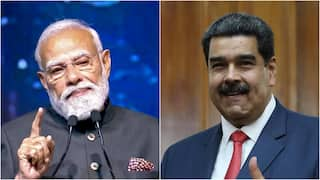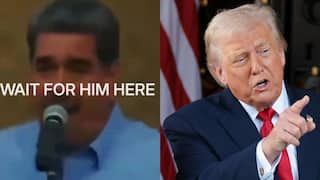OPINION: Budget 2025 Can Play A Critical Role In Strengthening Rupee, Boost FOREX Reserves. Here's How
The Union Budget 2025 holds the key to addressing the current economic challenges and paving the way for a brighter future.

By CMA Maithili Malpure
The Indian economy is currently facing significant challenges, with the Rupee weakening and foreign exchange (FOREX) reserves shrinking. As Finance Minister Nirmala Sitharaman prepares to present the Union Budget for 2025-26, all eyes are on the measures that will be introduced to address these pressing issues and ensure sustainable growth for the country. This article delves into the current economic scenario, its impact on the common man, and the potential improvements that the upcoming budget could bring.
Current Scenario
India's FOREX reserves have seen a significant decline, dropping to $634.59 billion from a peak of $704.89 billion in September 2024. This reduction can be attributed to various factors, including the Reserve Bank of India's (RBI) interventions in the forex market to manage rupee volatility and changes in the valuation of foreign assets.
The rupee has depreciated against the US dollar, recently breaching the 86 per dollar mark. This depreciation has created a ripple effect across the economy, impacting both businesses and individuals.
The reduction in FOREX reserves has been partly due to the RBI's efforts to stabilise the rupee amidst global economic uncertainties. The central bank's interventions have included selling dollars in the forex market to support the rupee, which has, in turn, led to a depletion of reserves. Additionally, the strengthening of the US dollar against other currencies has also contributed to the reduction in the value of India's foreign assets.
Impact On The Common Man
The weakening rupee and shrinking FOREX reserves have a direct and tangible impact on the common man. One of the most immediate effects is the rise in inflation, particularly in essential commodities such as food and fuel. The cost of imported goods has increased, leading to higher prices for a wide range of products. For households, this means tighter budgets and a greater struggle to make ends meet.
Rising inflation is particularly concerning in a country like India, where a significant portion of the population lives on limited incomes. The increase in the prices of essential commodities puts additional pressure on families, forcing them to cut back on discretionary spending. This reduction in consumer spending can lead to a slowdown in economic activity, creating a vicious cycle of reduced demand and slower growth.
Moreover, the depreciation of the rupee has made foreign travel and education more expensive for Indian citizens. Students planning to study abroad and families looking to travel internationally now face higher costs, which can be prohibitive for many. The weakened rupee also affects businesses that rely on imported raw materials or have foreign debt, as their costs increase and their profitability takes a hit.
Budget 2025 Expectations
In light of these challenges, the Union Budget 2025 aims to stabilise the economy, attract foreign investment, and ensure sustainable growth.
Several measures are expected to be introduced to address these issues and create a more conducive environment for economic development.
Tax Reforms and Relief:
To alleviate the financial burden on households, the budget is likely to include tax relief measures. This could involve raising the income tax exemption limit, reducing tax rates for lower income brackets, and increasing deductions for essential expenses such as education and healthcare. By putting more money in the hands of consumers, the government aims to boost domestic consumption and stimulate economic activity.
Job Creation and Skill Development:
Unemployment and underemployment are persistent issues in India, particularly among the youth. The budget is expected to focus on job creation through various initiatives, including increased spending on infrastructure projects, incentives for small and medium-sized enterprises (SMEs), and support for startups. Additionally, investments in skill development programs will help equip the workforce with the skills needed for emerging industries and technologies.
Incentives for Domestic and International Investors:
To attract foreign investment and boost economic growth, the government may introduce incentives for both domestic and international investors. These incentives could include tax breaks, simplified regulations, and financial support for sectors such as manufacturing, technology, and renewable energy. By creating a favourable investment climate, the government aims to attract capital inflows that can help stabilise the rupee and bolster FOREX reserves.
Strengthening Economic Resilience:
The budget will likely include measures to strengthen India's economic resilience in the face of global uncertainties. This could involve diversifying the country's export base, reducing dependency on certain imports, and building strategic reserves of critical commodities. By enhancing economic resilience, the government aims to protect the economy from external shocks and ensure long-term stability.
Focus on Renewable Energy and Sustainability:
With climate change and environmental sustainability becoming increasingly important, the budget is expected to prioritise investments in renewable energy and sustainable development. This could include incentives for solar and wind energy projects, subsidies for electric vehicles, and support for green technologies. By investing in sustainable initiatives, the government aims to create jobs, reduce carbon emissions, and position India as a leader in the global green economy.
The Union Budget 2025 holds the key to addressing the current economic challenges and paving the way for a brighter future. By focusing on the common man's concerns and implementing measures to improve the overall economic landscape, the government aims to ensure sustainable growth and prosperity for the country. While the road ahead may be challenging, the budget's emphasis on tax relief, job creation, investment incentives, and economic resilience provides a comprehensive approach to tackling the issues at hand.
As the country awaits the budget announcement, there is hope that the measures introduced will bring relief to households, stabilise the economy, and set India on a path to long-term growth and development. By addressing the immediate concerns of the common man and laying the groundwork for future prosperity, the Union Budget 2025 has the potential to be a turning point for India's economic trajectory.
(The author is an Assistant professor at the Dept of Commerce and Accounting at MIT-WPU, Pune)
Disclaimer: The opinions, beliefs, and views expressed by the various authors and forum participants on this website are personal and do not reflect the opinions, beliefs, and views of ABP Network Pvt. Ltd.





































